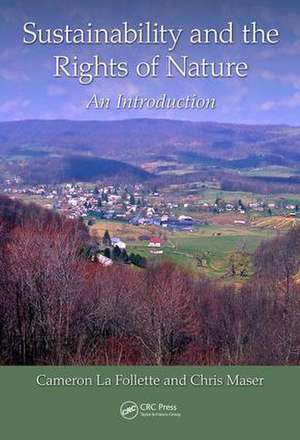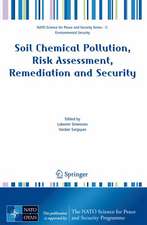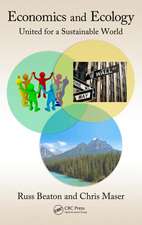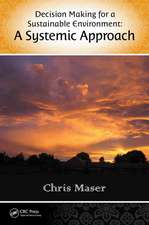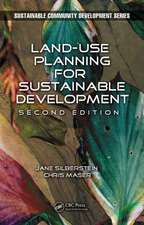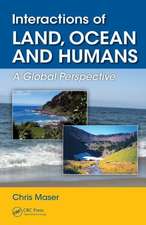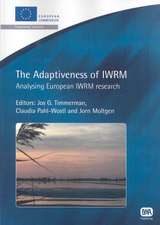Sustainability and the Rights of Nature: An Introduction: Social Environmental Sustainability
Autor Cameron La Follette, Chris Maseren Limba Engleză Hardback – 23 mai 2017
| Toate formatele și edițiile | Preț | Express |
|---|---|---|
| Paperback (1) | 499.76 lei 6-8 săpt. | |
| CRC Press – 10 dec 2019 | 499.76 lei 6-8 săpt. | |
| Hardback (1) | 1023.29 lei 6-8 săpt. | |
| CRC Press – 23 mai 2017 | 1023.29 lei 6-8 săpt. |
Preț: 1023.29 lei
Preț vechi: 1371.58 lei
-25% Nou
Puncte Express: 1535
Preț estimativ în valută:
195.80€ • 204.45$ • 161.69£
195.80€ • 204.45$ • 161.69£
Carte tipărită la comandă
Livrare economică 15-29 aprilie
Preluare comenzi: 021 569.72.76
Specificații
ISBN-13: 9781498788441
ISBN-10: 1498788440
Pagini: 434
Ilustrații: 46
Dimensiuni: 178 x 254 x 36 mm
Greutate: 0.93 kg
Ediția:1
Editura: CRC Press
Colecția CRC Press
Seria Social Environmental Sustainability
ISBN-10: 1498788440
Pagini: 434
Ilustrații: 46
Dimensiuni: 178 x 254 x 36 mm
Greutate: 0.93 kg
Ediția:1
Editura: CRC Press
Colecția CRC Press
Seria Social Environmental Sustainability
Public țintă
Academic and Professional Practice & DevelopmentCuprins
Introduction; Nature’s Laws of Reciprocity; Rights of Nature – The Emerging Legal Paradigm; Other International Voices for the Rights of Nature; Relationship: The Basis for Rights of Nature; Precursors to the Rights of Nature; International Steps Towards the Rights of Nature; Rights of Nature Concepts and Issues; The Problem of Technology; Corporations and the Rights of Nature; Land; Water; Air and Climate; Food Supply; Sources of Energy; Mining and Drilling; International Trade: Moving Goods and People; Conclusion: Rights of Nature and Our Responsibility.
Notă biografică
Cameron La Follette has a law degree from Columbia University School of Law, a Masters in Psychology from New York University, and a Bachelor’s in Journalism from the University of Oregon. Her initial environmental activism (1978-1982) was with Oregon nonprofit organizations that focused on preserving ancient forests on Federal public lands managed by the U.S. Forest Service and U.S. Bureau of Land Management to protect salmon habitat, clean drinking water, and forest ecosystems. She served on the Salem, OR, Planning Commission for three years (2002-05) applying the City of Salem’s land use and zoning ordinances to many situations ranging from residential housing to industrial and commercial properties. As Director of a nonprofit project (2004-2006), she focused on bringing people together to collaborate on coastal environmental problems. Since 2010, she has been Executive Director of an environmental and land use activist nonprofit that focuses on protecting the natural resources of the Oregon coast, working with residents to oppose ill-advised land use projects, and helping maintain livable coastal communities.
Chris Maser spent over 25 years as a research scientist in natural history and ecology in forest, shrub steppe, subarctic, desert, coastal, and agricultural settings. Trained primarily as a vertebrate zoologist, he was a research mammalogist in Nubia, Egypt, (1963-1964) with the Yale University Peabody Museum Prehistoric Expedition and a research mammalogist in Nepal (1966-1967), where he participated in a study of tick-borne diseases for the U.S. Naval Medical Research Unit #3 based in Cairo, Egypt. He conducted a three-year (1970-1973) ecological survey of the Oregon Coast for the University of Puget Sound, Tacoma, Washington. He was a research ecologist with the U.S. Bureau of Land Management for thirteen years--the first seven (1974-1981) studying the biophysical relationships in rangelands in southeastern Oregon and the last six (1982-1987) studying old-growth forests in western Oregon. He also spent a year as a landscape ecologist with the U.S. Environmental Protection Agency (1990-1991).
He is an independent author as well as an international lecturer, facilitator in resolving environmental conflicts, vision statements, and sustainable community development. He is also an international consultant in forest ecology and sustainable forestry practices. He has written or edited over 290 publications, including 39 books.
Chris Maser spent over 25 years as a research scientist in natural history and ecology in forest, shrub steppe, subarctic, desert, coastal, and agricultural settings. Trained primarily as a vertebrate zoologist, he was a research mammalogist in Nubia, Egypt, (1963-1964) with the Yale University Peabody Museum Prehistoric Expedition and a research mammalogist in Nepal (1966-1967), where he participated in a study of tick-borne diseases for the U.S. Naval Medical Research Unit #3 based in Cairo, Egypt. He conducted a three-year (1970-1973) ecological survey of the Oregon Coast for the University of Puget Sound, Tacoma, Washington. He was a research ecologist with the U.S. Bureau of Land Management for thirteen years--the first seven (1974-1981) studying the biophysical relationships in rangelands in southeastern Oregon and the last six (1982-1987) studying old-growth forests in western Oregon. He also spent a year as a landscape ecologist with the U.S. Environmental Protection Agency (1990-1991).
He is an independent author as well as an international lecturer, facilitator in resolving environmental conflicts, vision statements, and sustainable community development. He is also an international consultant in forest ecology and sustainable forestry practices. He has written or edited over 290 publications, including 39 books.
Recenzii
"This new book provides ecological, historical, legal, and contextual information about the wide range of seemingly insurmountable challenges we face around the planet. Thankfully, along with in-depth analyses of the problems and causes, the recommended solutions presented seem attainable. The lists of specific recommendations for management, restoration, research, and governance, all emphasize justice. Indeed, The Rights of Nature, as an overarching framework for choice-making at all levels of governance, from personal to global, is a greatly needed manifesto."
—Judith Ann Wait, Washington State University, Vancouver, Washington, USA
"This wonderful book proposes a new framing that provides some questions that we need to ask – and some answers that may be the ones we need. One need not subscribe to every argument they offer in this book. But one cannot read this book without opening one’s eyes to new insights and new possibilities."
—John E. Bonine, University of Oregon, Eugene, Oregon, USA
"As an avid reader, now in my seventies, I have found that only about twice a decade a book comes along that challenges the foundation of what I know and provokes me to think afresh. The Rights of Nature is such a book. La Follette and Maser have used the lens of systems theory to capture the history, ecology, geography, technologies, laws, and politics, as well as challenges and solutions, to the relationships of people to the planet. The book consolidates the complex dimensions of human and natural systems to support a paradigm shift, which embeds the Rights of Nature in national and state constitutions, to create the essential reciprocity between people and the planet."
—Thomas J. Gallagher, University of Alaska, Fairbanks, Alaska, USA
"We can no longer sit back and expect change to happen. As the living citizens of Earth, it is our duty to protect our home planet for our posterity and for all living creatures. Cameron La Follette and Chris Maser’s thinking can complement a public trust approach in the campaign for stewardship, not destruction, of our Earth. A rights of nature approach can lead society towards a new ethic, one calling for restraint and harmony with the natural world we rely on—so that all species, not just humans, can flourish."
—Mary Wood, University of Oregon, Eugene, Oregon, USA
"In Sustainability and the Rights of Nature: An Introduction, La Follette and Maser dramatically outline what is at stake if we continue current environmental policies and what approaches are necessary to improve the sustainability of our global lifeboat."
— Timothy D. Schowalter, Louisiana State University, Baton Rouge, Louisiana, USA
"Sustainability And The Rights Of Nature: An Introduction may be Chris Maser’s most ambitious work. In collaboration with attorney Cameron La Follette, the book makes an impassioned and compelling case for the premise that humankind cannot flourish, or perhaps even survive, unless we recognize the primacy of the natural world within which our produced world of goods and artifacts is embedded. Cameron La Follette contributes the vital legal background that allows the book to demonstrate that the task of elevating the Rights of Nature must ultimately be a clear-eyed and practical task that recruits our formal legal systems to the effort. This rich and carefully crafted work makes an impressive and ultimately optimistic contribution to the creation of a humble, but satisfying, human presence on our one and only home planet."
—C. Russell Beaton, Willamette University, Salem, Oregon, USA
—Judith Ann Wait, Washington State University, Vancouver, Washington, USA
"This wonderful book proposes a new framing that provides some questions that we need to ask – and some answers that may be the ones we need. One need not subscribe to every argument they offer in this book. But one cannot read this book without opening one’s eyes to new insights and new possibilities."
—John E. Bonine, University of Oregon, Eugene, Oregon, USA
"As an avid reader, now in my seventies, I have found that only about twice a decade a book comes along that challenges the foundation of what I know and provokes me to think afresh. The Rights of Nature is such a book. La Follette and Maser have used the lens of systems theory to capture the history, ecology, geography, technologies, laws, and politics, as well as challenges and solutions, to the relationships of people to the planet. The book consolidates the complex dimensions of human and natural systems to support a paradigm shift, which embeds the Rights of Nature in national and state constitutions, to create the essential reciprocity between people and the planet."
—Thomas J. Gallagher, University of Alaska, Fairbanks, Alaska, USA
"We can no longer sit back and expect change to happen. As the living citizens of Earth, it is our duty to protect our home planet for our posterity and for all living creatures. Cameron La Follette and Chris Maser’s thinking can complement a public trust approach in the campaign for stewardship, not destruction, of our Earth. A rights of nature approach can lead society towards a new ethic, one calling for restraint and harmony with the natural world we rely on—so that all species, not just humans, can flourish."
—Mary Wood, University of Oregon, Eugene, Oregon, USA
"In Sustainability and the Rights of Nature: An Introduction, La Follette and Maser dramatically outline what is at stake if we continue current environmental policies and what approaches are necessary to improve the sustainability of our global lifeboat."
— Timothy D. Schowalter, Louisiana State University, Baton Rouge, Louisiana, USA
"Sustainability And The Rights Of Nature: An Introduction may be Chris Maser’s most ambitious work. In collaboration with attorney Cameron La Follette, the book makes an impassioned and compelling case for the premise that humankind cannot flourish, or perhaps even survive, unless we recognize the primacy of the natural world within which our produced world of goods and artifacts is embedded. Cameron La Follette contributes the vital legal background that allows the book to demonstrate that the task of elevating the Rights of Nature must ultimately be a clear-eyed and practical task that recruits our formal legal systems to the effort. This rich and carefully crafted work makes an impressive and ultimately optimistic contribution to the creation of a humble, but satisfying, human presence on our one and only home planet."
—C. Russell Beaton, Willamette University, Salem, Oregon, USA
Descriere
Sustainability and the Rights of Nature: An Introduction is a much-needed guide that addresses the exciting and significant paradigm shift to the Rights of Nature, as it is occurring both in the United States and internationally in the fields of environmental law and environmental sustainability. The authors advocate building a relationship of integrity and reciprocity with the planet by placing Rights of Nature in the forefront of our rights-based legal systems. They explore means of achieving this by first laying out Nature’s Laws of Reciprocity and then providing a roadmap of the strategies and directions needed to create a Rights of Nature-based legal system that will shape and maintain human activities in an environmentally sustainable manner.
